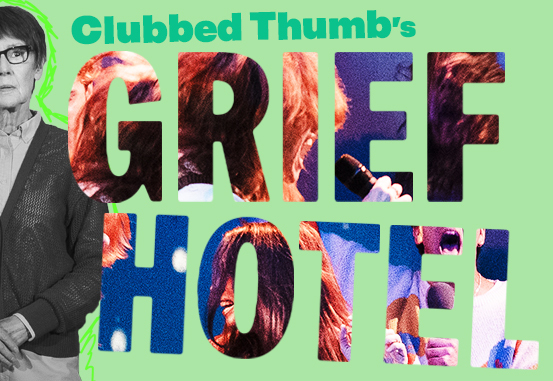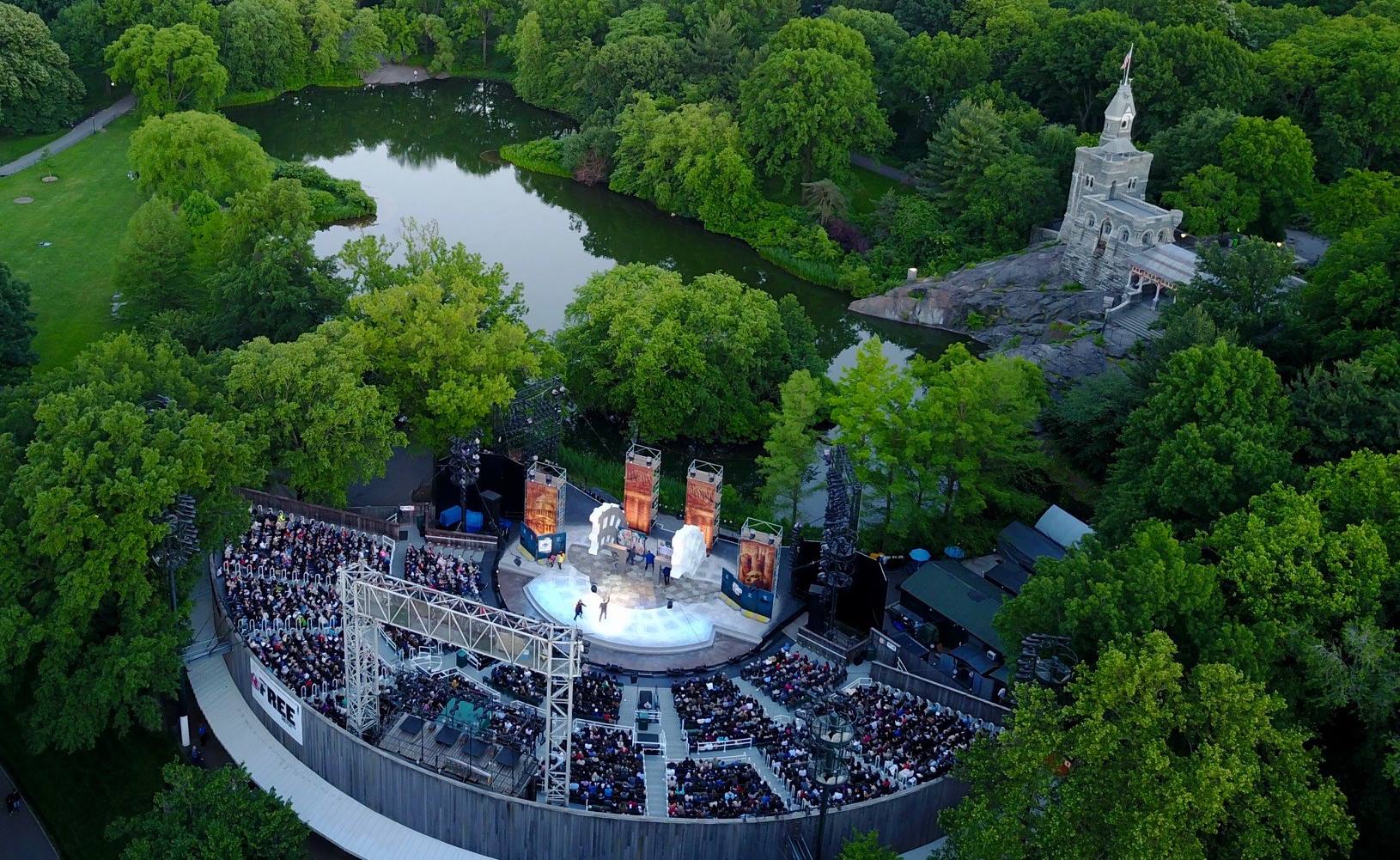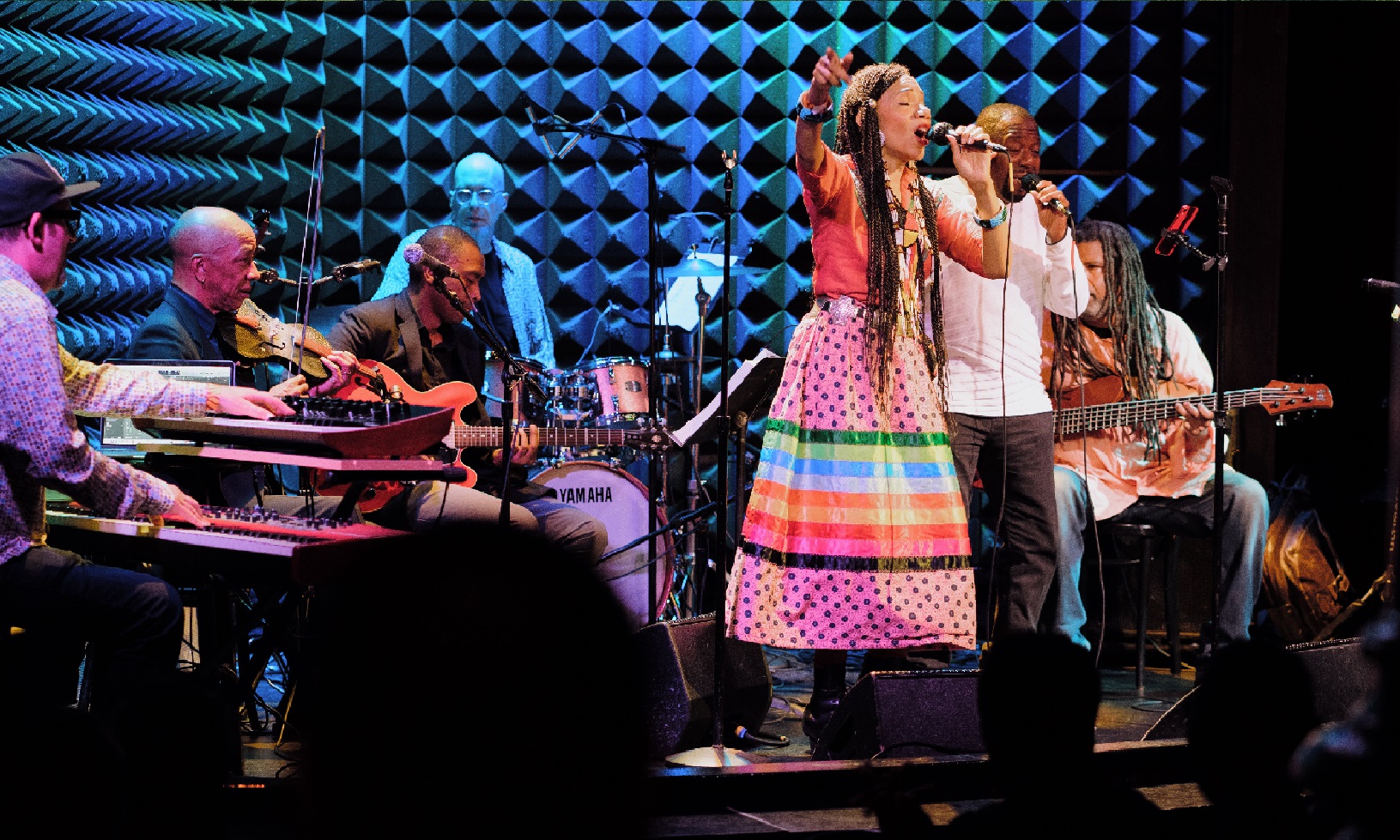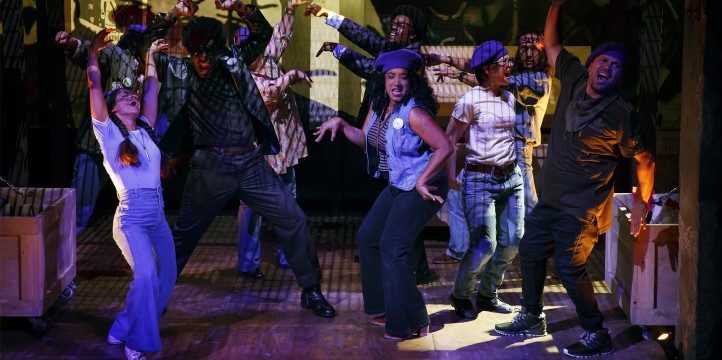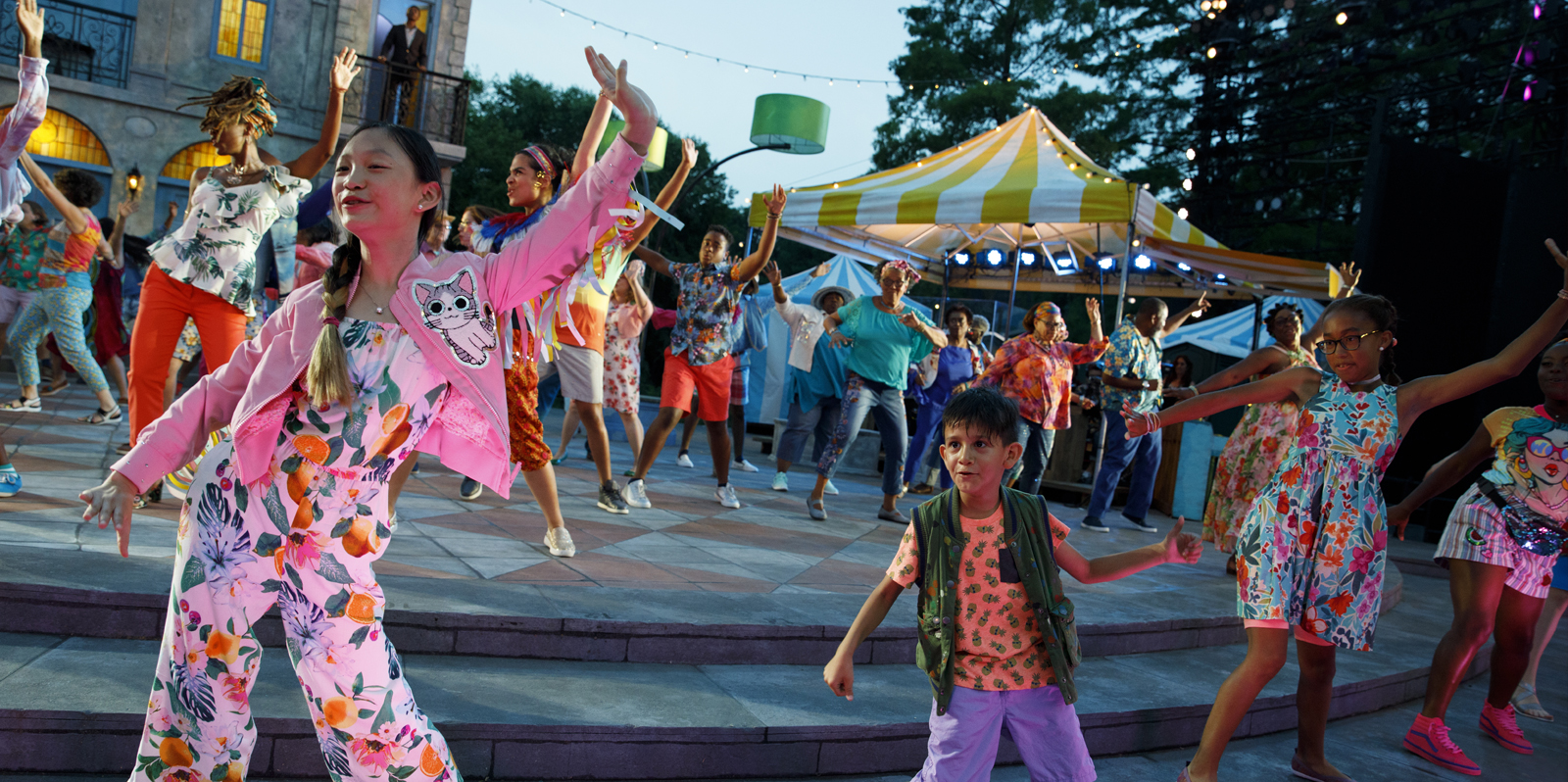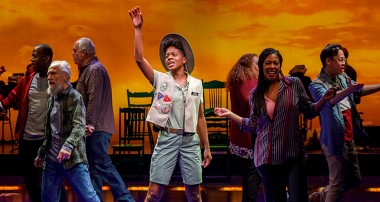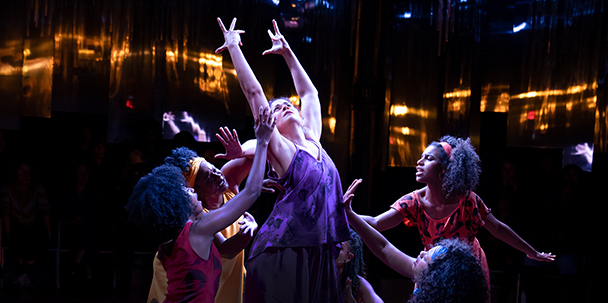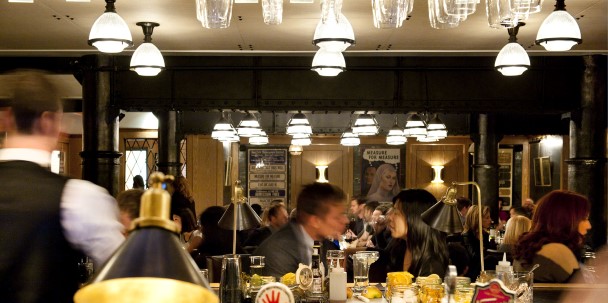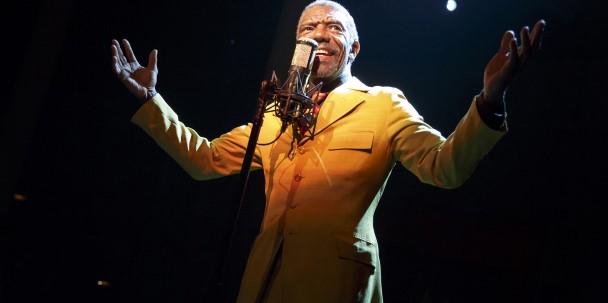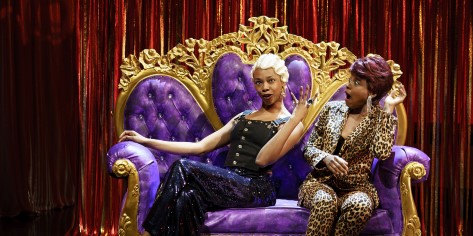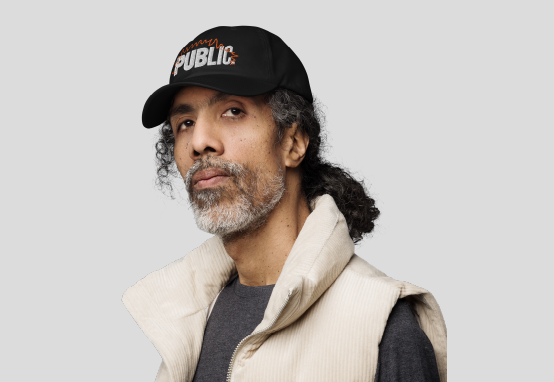Fernando Masterson: In 1954, a man named Joe Papp decided to bring free performances of Shakespeare to the people of New York. He toured the parks across the city, eventually ending up in Central Park and on Aster Place.
Reynaldi Lindner Lolong: But that was just the beginning. What began as summertime Shakespeare in neighborhood parks has since blossomed into a year-round hub of culture, featuring new plays and musicals, live music, international performance art, cabaret, community dialogue, civic engagement, and of course, Shakespeare.
FM: Through it all, the impulse has remained the same: to be a theater that is of, by, and for all people. Welcome to Public Square, a podcast of The Public Theater.
RLL: Hey, Fern.
FM: Hey, Reynaldi! What’s up?
RLL: It is December. The holidays are here. We just actually finished up, last week, our team Thanksgiving potluck, which was amazing.
FM: So full. I am still full from it. It’s crazy.
RLL: And heading into December, which means the return of what I like to call The Public Theater’s version of The Nutcracker, which is Public Forum’s presentation of The Long Christmas Dinner.
FM: Long Christmas Dinner! Speaking of dinners. And it’s got a winner lineup, and the things keep getting wilder and wilder each year. You wanna tell why?
RLL: Because it’s written by Thornton Wilder. Fern is really proud of that pun.
FM: I am trying to make this pun a thing, and it’s—I’m trying to make it happen, and it’s not gonna happen. I just saw Mean Girls, so—anyway—
RLL: The Long Christmas Dinner performs in Joe’s Pub and it returns every year with a different cast, always led by Tappan Wilder, but this year we have a—a lot of exciting new fresh faces to the cast, right, Fern?
FM: Yeah, fresh faces that have been in the Delacorte for the Queer & Now event that we did in the summer, so we’ve got Murray Hill, Jari Jones, Diana Oh, of course Tappy Wilder, Chase Strangio, and um, Ryan Haddad, who keeps coming back!
RLL: Yeah. As you may, longtime listeners—longtime??—
FM: [laughs]
RLL: —of Public Square may have noticed that we somehow manage to sneak a mention or shoutout to Ryan in pretty much every episode, so. Long Christmas Dinner comes to Joe’s Pub December—
FM: December 8th.
RLL: Also coming up in December here at The Public, continuing performances of For Colored Girls…, as well as A Bright Room Called Day, and that leads us directly into our guests for today’s episode.
FM: Stage managers!
RLL: We are talking to Alyssa Howard and Buzz Cohen. Alyssa is the Stage Manager for For Colored Girls…, and Buzz Cohen is the Stage Manager A Bright Room Called Day.
FM: And they’ve both worked in, you know, with The Public in different capacities, and we’re gonna learn all about it and get to talk to them. And I think y’all are gonna like the conversation.
AH: Hello, my name is Alyssa; I am the PSM of For Colored Girls…. This is my third show working in The Public, my second show working for The Public, my first time PSMing for The Public.
BC: I’m Buzz Cohen. I’ve been a stage manager since 1977, I’ve been a stage manager at The Public since 1985, and A Bright Room Called Day is my 76th show for The Public Theater.
FM: What—what got you started? I mean, what made you want to go into stage management?
BC: Well, I was not going to go into stage management; in fact, I love languages and I was going to be a simultaneous interpreter at the U.N.
FM: Whoaaa.
BC: And that was the plan and I went to school in Spain and—the skills are actually not dissimilar; it’s about putting pieces of a puzzle together.
FM: I was gonna ask. Okay.
BC: Um, but I did write, and when I was in high school, there was an experimental performance group—this was back in the era when like, The Open Theater and The Living Theatre were what you aspired to be—and they called upon me to help them develop a script. And I fell head-over-heels in love. But I didn’t know if I were in love with theatre or the people I was working with, because it’s easy to confuse those two things. So when I went off to Westland, where I was still going to be dealing with languages, I chose what looked to me to be the least glamorous, most arduous job that I could see in theatre, which was stage management. So my first semester of my freshman year, I stage managed my first show, and discovered that what I really loved was in fact stage management. It was an exact and perfect fit with every aspect of my being, and I have never wanted to be or do anything else.
RLL: Alyssa, like, what about you? How did you get the stage management bug?
AH: Um, well technically, the first time I stage managed was when I was ten years old. I was very—loved Broadway musicals, loved performing, and then when we were doing the fifth grade musical, I can’t remember the context at all, but I just remember the music teacher telling me, “Okay, and also, you’re the Stage Manager,” with no further explanation. So I’m like, that sounds like someone who knows what’s going on onstage, so—so I watched during the dress rehearsal, made sure I watched the entire show, and then during the—our performances, I just stayed backstage, during the times when I was not on stage performing, and ordered around all of the volunteer mom stagehands and made sure that they stayed organized backstage.
FM: As a fifth grader; I love that.
AH: As a fifth grader, um, just going on pure instinct. I did not stage manage again until I was an undergrad; I was still performing, still acting at that point, though pretty sure I was going to be a doctor or a politician, who knows, some sort of “real job.” And then I did not get cast in the next show that I auditioned for, and on the little sheet, it said, “If you are not cast in the show, would you be willing to do such and such and such and such?” I said, “Y’know what, I took a course in stage management and I enjoyed it.”
FM: Yeah.
AH: So that was the first show that I stage managed, um, and it was—let’s see, what was it?—it was As You Like It at the 92 Center black box theater at Williams College. It was—it was actually the very first production in their new space there. Uh, so that was fun, so after that I said, “Wow, that was great, it was a lot of fun, I did a good job and I am never doing that again because it put my grades and my health in the toilet.”
FM: Oh, man, grades and health in the toilet!
[laughter]
AH: Uhhh—
FM: Is it still that way?
AH: So—so I stayed away, I managed to stay away for two semesters, then I was back again, continued that push and pull a little while. My first job out of undergrad, I was still working in music at that point, and then I just missed theatre too much, and said, “You know, if there’s ever a time to give it a try, it seems like now.” And so it was the 2008/2009 season at Orlando Shakespeare Theater, I did my first work in a professional theater there; I was one of their stage management apprentices and there’s been no going back.
FM: With all that said, do we have a most memorable moment? Like, the most memorable—’cause I imagine the day-to-day for a stage manager is—no two days are the same, I’m sure. Do you have a most memorable moment?
AH: When I was, um, at Orlando Shakes, during one of our Theater for Young performances, Theater for Young Audiences performances of The Velveteen Rabbit, we have an audience full of children, and our Skin Horse just passed out onstage in the middle of a scene. Um, I don’t really remember much surrounding that; I know that we got things done and taken care of, but I just never will forget that the kids just watched the Skin Horse keel over.
[laughter]
FM: Well, I imagine in this line of work that’s such an important part; y-you really have to think on your feet, because you’re kind of—you’re running the show, I mean, and you have to adapt and overcome and know that—I mean, kudos, but I mean, what do you do when the horse, y’know? I—
AH: We got him offstage, we did first aid; he overheated because his costume didn’t have good ventilation, as it turned out, and under those lights it was very hot. Uh, we paused the show briefly, but we were able to continue—I think, luckily, he was not in a few scenes at that point. And we also made measures going forward that we, uh, figured out how to get ice packs and such into his costume so it would not happen again.
FM: Adapt and overcome.
AH: Yes.
FM: Buzz?
BC: Well, I would draw the distinction between cherished and memorable, for me.
[laughter]
AH: Yes. I did not cherish that moment, but I remember it.
RLL: That’s the title of our episode: Cherished and Memorable.
BC: Um, on the cherished side I will say that often you have a very close relationship with a cast, and now—I mean, obviously you can work out how old I am by when I started and how many shows—but at this point, when I will have a young person who is starting out and we will get to a show and there’s this standing ovation which is clearly for them, I now weep as if I were their mother.
RLL: Awww.
BC: It, y’know, it just—it’s remarkable what an emotional experience it is, and how much we are invested in the people that we’re working with. On the most memorable side, it’s no surprise for me to say, to any Public Theater people, that our production of Julius Caesar in the park will always remain one of the more memorable, because of the controversy that was excited during that production, and how it’s—not unlike what I was just saying—that I of course felt very protective of my actors as the controversy was expanding, and when in fact the production itself was physically invaded by protesters. I realize that the first line in my obituary is going to be, “Ladies and gentlemen, please let’s pick up with, liberty, freedom”—which is—was my live mic announcement after the scene of the assassination was in fact stopped by a protestor—
AH: I was just about to say, Buzz, when you mentioned about relationships, it made me think of something that I cherish and that it didn’t immediately come to mind because they aren’t so much memories but things that have grown out of work that I’ve done, that are ongoing. Um, one is that a production of Henry VI that I did with NAATCO over a year ago, uh, the company was so close and such a family from that, that we continued to meet up and get together well over a year later, and it just was such a—a formative experience for so many of us to be able to do such a large-scale show and a large-scale Shakespeare show that many of the actors have never been given the opportunity to before, um, that it really formed quite a family out of us.
RLL: It’s interesting, you both kind of touched on an interesting, um, angle in that you know, I think when people think of stage managers, there’s somewhat of an understanding of like, the hard technical skills of like, being very organized, being very punctual, being able to run a room, but like, there’s such an aspect of like, the people skills—
FM: Yeah.
RLL: —that I’m fascinated by. Because on one hand you really have to know how to manage a lot of personnel and priorities, but you also have to, like, get people to trust you and grow close. And like, how do you—how do you manage that balance with so—particularly like when there could be any number of just interpersonal dynamics in any room at any time?
FM: Mhmm.
BC: But—but that really is a balance, because as fond as I may be of any human being in the room, I also have to be able to step back from it, and I’m sure that every stage manager will tell you that, because if—if an actor or a director or a designer is upset, I have to acknowledge and honor that emotion, but it can’t be my emotion too. I have to be able to be in a problem-solving mode.
AH: It’s like sometimes you have friends that you could be roommates with, or—and sometimes you can’t; like, sometimes you’re able to have those things coexist but there’s some times when they don’t, and it’s no—it’s no negative thing.
BC [overlapping]: Oh. Oh, I will say to a friend before a show, “Look, don’t take it personally, but in the room I’m sort of going to have to pretend that I don’t know you.”
AH: Yeah.
BC: Because also in the room, no one can think that I have a favorite, because that would be deadly; I mean, they have to know that we are fair, no matter what.
AH: And I think part of the trust comes from, at least for me when I’m working on it, I ultimately feel like I’m working for the production; I’m not working for any individual one person.
FM: Right.
AH: And I feel that, if they can trust that I have integrity and that I’m working for the good of the production—and I feel, you know, in good faith that is what everyone is there for—that that allows for there to be that trust even if one person—even if a person is having individual feelings in the moment, that you can see and honor but not necessarily go along with, that at the end of the day you realize that you’re on the same side with that.
RLL: But I have to say, one of my favorite things about reading stage management reports is lines like, “The audience seemed especially rapt during 2.3, but on the edge of their seat at the revelation—following like, Desiree’s revelation.” And to see these little nuances of how a room reacts, like how an audience reacts each night. So, how do you think about those moments while calling cues and making sure everyone is—the engine is moving. Like, how—like, that seems like such a different part of your brain, but it’s always so succinctly captured.
BC: Some of it is subliminal, I mean, you always can feel the audience, and actually, one of the things that I love about The Public is that most of our booths are open booths, so you’re in the same air as the audience and your actors.
AH: It’s always such a disconnect when you’re way, way back into some closed-off room.
BC: Yep, I—I thoroughly dislike a closed booth. It gives you the luxury that you can raise your voice, but other than that, I would much rather be in the same air as my audience, and particularly my actors. So you feel them ripple, you—even when you’re doing something else, their presence is palpable with who your audience is. You know, is it a younger audience? An older audience? You know, what is the culture in that particular audience? And that will change things massively. And even when we’re calling cues, we’re also also aware of what the audience is doing, because our cues may be timed to—you know, waiting on a laugh, or not waiting on a laugh.
FM [overlapping]: Okay. Makes sense.
BC: So, I mean, we—we have to be aware of them.
AH: Yeah, or waiting on, not cutting off applause but not letting it --
BC [at the same time]: Exactly. Oh boy. Yes.
AH: You’re playing a role in like, shepherding that audience’s experience.
BC: It’s like, you know, can we, can we gut out the length of that laugh?
[laughter]
AH: Um, but I also do think that it’s, ah, related throughout the process to—when you’re in rehearsal, you’re constantly taking in on subliminal and active levels, like, what is the temperature of the room? How—what is the feeling right now? And you always have those sensors out, and I feel like it’s really a related thing. When you’re in performance, you still are taking in the temperature of the room, and you know, have your sensors out for what’s going on in here.
FM: This actually leads us perfectly to our kind of final question. The last thing we kind of wanted to touch base with you both on is: what kind of advice would you give to someone that might be, you know, interested in this kind of work? Or maybe they aren’t interested in it—um, give them a sales pitch. Buzz, you did a pretty good one earlier, but—what advice would you have for someone, you know, looking to be a stage manager? Maybe not looking.
BC: It’s the best job in theatre.
FM: Hm.
BC: Uh, if I were someone who were at home in my body, I would say it’s like dancing with the play. There is a profound involvement in every aspect of the production: the people, the physical production, the calling of the shows and the rhythm of it. It—I think it is the single most connected job in the entire production, physically, emotionally, across the board, and if we do our job properly, they get to make art, which is a privilege for me. I know that you had, you’d had a sample question about, you know, who do you serve? And I used to say, as a joke, “We live to serve,” and then I realized it wasn’t a joke; there is a profound joy in the service that we do to the production. And I can’t think of anything in my experience which has given me as much satisfaction as stage management does.
FM: Wow.
AH: My—my general elevator pitch: I mentioned that I come from a music background, and the closest comparison that I usually have for stage management work is accompanying. Um, there’s obviously the more obvious, like when you’re calling cues, yes, you have to be in sync with them, you’re supporting that, but even on a more abstract level, it’s about being in sync with everyone and everything that is happening. It’s about being prepared, and too, being ready so that you can give them support and lift up what they’re doing. It’s about when, you know, you make a mistake or someone else makes a mistake, you have to adapt to that and keep on going. And—and as Buzz mentioned, connection; it is so connected, and being able to have that connection to every aspect of the production—the designers and the directors, the actors, all of the tech and design elements, the audience—is just such a wonderful, wonderful experience.
FM: Wow.
RLL: Alyssa, Buzz, I know you are both so busy with your shows, and I think are both of to like, gather actors and do things on our stages—
FM: This was like the one hour off. This was their one hour off and they spent it with us.
RLL: Um, but thank you so much for taking the time. This was amazing.
BC: Our pleasure.
AH: Thank you.
MO: Hi, I’m Mariana Ortiz. I am the Operations Associate for The Public Theater. I’m—I have been working at The Public for three years, although it seems like ten for some reason. I’m—yeah, enjoying it so far.
FM: Tell us about your work here, and what you do here at The Public.
MO: Yeah, of course. I’m—uh, first of all I’m from Puerto Rico, I was born and raised in the island, I’m—and long story short, I moved to New York eight years ago to go to a school here. I have a Master’s in Theatre Management and Producing at Columbia, and then after that I—my plan was to always return back to Puerto Rico and do that at home, but I got an opportunity of working for a smaller cultural organization down at the Lower East Side, and that really taught me a lot about operations. Because I’m—the—literally, for the lack of staff, I just like, jumped right to the operations side of the job and I really fell in love with it, which is what brought me to The Public.
I think the biggest part of my job responsibilities is basically the main connection with the Production department, so whenever there is a, like a creative mind, let’s just say a director, a designer, all of that—when they come in to and they are approved to do a show here, I am the facilities and operations person and it’s like, “We can do that. We need a permit for that. Are you looking at safety, security?” Um, my day to day consists of a lot of interacting with every single staff member within the organization, from production crews to administrative staff, to my dear operations crew, which is, I am proud to say, it’s one of the biggest departments of the building, just to maintain the facilities, to keep them running, to keep them clean, to keep them in good shape for all to enjoy.
FM: Let’s say you’re speaking to someone that maybe is interested in working in theatre, but not really sure how, or someone who might be interested in working in ops.
MO: I’m—there is a whole world out there, from like, sound engineers to carpenters to electricians, that really do work to create the major goal, that is, like, putting a show together. And I see the operations and facilities as like an essential link to it. As my very good friend Ryan says, we are the first ones to open the building and the last ones to leave; we are always here.
FM: Well, and then let me say, I know ops—I see it as the backbone of the institution, because I love what you had said, you are the first ones to get here in the morning, open the door, and the last ones to leave, and there is so much—
MO: Or actually, never leave!
FM: “We are always here”—I love that.
MO: Yeah.
FM: But, uh, we’re all playing our part, and you have played such an amazing part, so thank you, Mariana, so much just for being here, and thank you for being my friend!
MO: Of course. Absolutely. Thank you for the invitation.
RLL: And that’s our show, folks! I love how all of this episode’s conversations have really been about these kind of behind-the-scenes paths in theatre that you don’t really think, like, exist, or like, how you get into them.
FM: There are so many people and departments that touch the art and move it forward and are necessary in order for the mechanism to move forward, and I love, love getting to talk to these people who I mean even we don’t get to talk to very often, because we’re just—we’re just one department in The Public, or we just, we just work two things here, so.
RLL: They’re both examples of jobs where I think, when they’re being done really well, you don’t really notice it—
FM [overlapping]: Don’t realize it!
RLL: —even happening.
FM: Exactly. Exactly. And lemme tell you, this—we’ve got—it’s a well-oiled machine and I’m so proud to be a part of it. And I mean, moving forward, we’ve got even more great things in the well-oiled machine coming up on the horizon. We can talk about the spring!
RLL [at the same time]: Yes. Yes! Heading into the spring, we—
FM: It’s not too early. I mean, Christmas tree’s up, we’re good.
RLL: We have Coal Country, which is based on a true story around a mining disaster in West Virginia.
FM: And, shout-out for all the Steve Earl fans: Coal Country is Steve Earl’s music, right?
RLL: Yes. Original music by Steve Earl.
FM: And let me tell you, I stan Steve Earl. Um, Steve, if you’re listening, hey! We’d love to have you—

